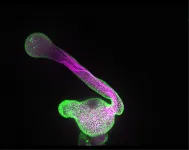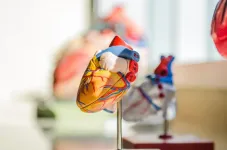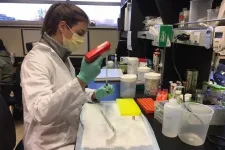Membrane building blocks play decisive role in controlling cell growth
2021-02-15
(Press-News.org) Lipids are the building blocks of a cell's envelope - the cell membrane. In addition to their structural function, some lipids also play a regulatory role and decisively influence cell growth. This has been investigated in a new study by scientists at Martin Luther University Halle-Wittenberg (MLU). The impact of the lipids depends on how they are distributed over the plasma membrane. The study was published in "The Plant Cell".
If plant cells want to move, they need to grow. One notable example of this is the pollen tube. When pollen lands on a flower, the pollen tube grows directionally into the female reproductive organs. This allows the male gametes to be delivered, so fertilisation can occur. The pollen tube is special in that it is made up of a single cell that continues to extend and, in extreme cases, can become several centimetres long. "This makes pollen tubes an exciting object for research on directional growth processes," says Professor Ingo Heilmann, head of the Department of Plant Biochemistry at MLU.
For the current study, Heilmann's team focused on the phospholipids of pollen tubes, which, as the main component of the plasma membrane, are responsible for separating the cell's interior from its surroundings. "Lipids are generally known to have this structuring function," says Dr Marta Fratini, first author of the study. It has only recently come to light that some phospholipids can also regulate cellular processes. The scientists from Halle have now been able to show that a specific phospholipid called phosphatidylinositol 4,5-bisphosphate ("PIP2") can control various aspects of cell growth in pollen tubes - depending on its position at the plasma membrane. They did this by labelling the lipid with a fluorescent marker. "We found it is either distributed diffusely over the entire tip of the pollen tube without a recognisable pattern, or is concentrated in small dynamic nanodomains," Fratini explains. One can imagine a group of people on a square: either individuals remain 1.5 metres apart as currently prescribed, or they form small groups.
It appears that different enzymes are responsible for the varying distribution of PIP2. "Plant cells have several enzymes that can produce this one phospholipid," explains Heilmann. Like the lipids, some of these enzymes are widely distributed over the membrane and others are concentrated in nanodomains, as shown by the current study. Depending on which of the enzymes the researchers artificially increased, either the cytoskeleton - a structure important for directed growth - stabilised and the pollen tube swelled at the tip, or more pectin - an important building material for plant cell walls - was secreted. This made the cell branch out at the tip. To make sure that the distribution of the lipids was indeed responsible for these growth effects, the biochemists artificially changed the arrangement of the enzymes at the plasma membrane - from clusters to a wide scattering or vice versa. It turns out they were able to control the respective effects on cell growth.
"As far as I know, our study is the first to trace the regulatory function of a lipid back to its spatial distribution in the membrane," says Heilmann. Further research is now needed to clarify exactly how the membrane nanodomains assemble and how the distribution of PIP2 at the membrane can have such varying effects.
INFORMATION:
The research was funded by the Deutsche Forschungsgemeinschaft (German Research Association, DFG) through various programmes, including the Research Training Group 2498 "Communication and Dynamics of Plant Cell Compartments", and supported by the Centre for Innovation Competence HALOmem at MLU.
[Attachments] See images for this press release:

ELSE PRESS RELEASES FROM THIS DATE:
2021-02-15
An international team of scientists has sequenced the genome of a capuchin monkey for the first time, uncovering new genetic clues about the evolution of their long lifespan and large brains.
Published in PNAS, the work was led by the University of Calgary in Canada and involved researchers at the University of Liverpool.
"Capuchins have the largest relative brain size of any monkey and can live past the age of 50, despite their small size, but their genetic underpinnings had remained unexplored until now," explains Professor Joao Pedro De Magalhaes, who researches ageing at the University of Liverpool.
The researchers developed and annotated a reference assembly for white-faced ...
2021-02-14
Aspirin should be favoured over warfarin to prevent blood clotting in children who undergo a surgery that replumbs their hearts, according to a new study.
The research, led by the Murdoch Children's Research Institute (MCRI) and published in The Journal of Thoracic and Cardiovascular Surgery, will have implications for clinicians when prescribing blood thinning medications after Fontan surgery, a complex congenital heart disease operation redirecting blood flow from the lower body to the lungs.
The Fontan procedure is offered to children born with severe heart defects, allowing the child to live with just one pumping heart chamber ...
2021-02-13
In a SWOG Cancer Research Network trial that put three targeted drugs to the test, the small molecule inhibitor cabozantinib was found most effective in treating patients with metastatic papillary kidney cancer - findings expected to change medical practice.
These findings will be presented at ASCO's virtual 2021 Genitourinary Cancers Symposium on Feb. 13, 2021 at 1 p.m. ET. The findings will be simultaneously published in The Lancet.
There are currently no effective treatments for metastatic papillary kidney cancer, or metastatic pRCC, a rare subtype of kidney cancer. One study of 38 patients found that the average survival ...
2021-02-13
Lenvatinib plus pembrolizumab yields better overall survival than single-agent sunitinib when given as first-line therapy in untreated patients with metastatic kidney cancer
The combination also improved progression-free survival and overall response rate
BOSTON - Patients with advanced kidney cancer, who received a targeted drug combined with a checkpoint-blocker immunotherapy agent had longer survival than patients treated with the standard targeted drug, said an investigator from Dana-Farber Cancer Institute, reporting results from a phase 3 clinical trial.
The survival benefit demonstrates that an immune checkpoint inhibitor together with a targeted kinase inhibitor drug "is important ...
2021-02-13
A test that monitors blood levels of DNA fragments released by dying tumor cells may serve as an accurate early indicator of treatment success in people in late stages of one of the most aggressive forms of skin cancer, a new study finds.
Led by NYU Grossman School of Medicine and Perlmutter Cancer Center researchers, the investigation looked at adults with undetectable levels of freely circulating tumor DNA (ctDNA) four weeks into drug treatment for metastatic melanoma tumors that cannot be removed surgically (unresectable). The study showed that these patients, all of whom had common genetic changes (BRAFV600 mutations) linked to cancer, were living ...
2021-02-13
Peer-reviewed / Review, Survey and Opinion piece
To ensure an effective global immunisation strategy against COVID-19, vaccines need to be produced at scale, priced affordably, and allocated globally so that they are available where needed, and successfully rolled out.
Review of evidence includes a comparison of 26 leading vaccines on their potential contribution to achieving global vaccine immunity, and a new survey of COVID-19 vaccine confidence in 32 countries.
Having new COVID-19 vaccines will mean little if people around the world are unable to get vaccinated in a timely manner. ...
2021-02-12
A new study from Washington University School of Medicine in St. Louis demonstrates that a liquid biopsy examining blood or urine can help gauge the effectiveness of therapy for colorectal cancer that has just begun to spread beyond the original tumor. Such a biopsy can detect lingering disease and could serve as a guide for deciding whether a patient should undergo further treatments due to some tumor cells evading an initial attempt to eradicate the cancer.
The study appears online Feb. 12 in the Journal of Clinical Oncology Precision Oncology, a journal of the American Society of Clinical Oncology.
While a few liquid biopsies have been approved ...
2021-02-12
FOR IMMEDIATE RELEASE
Scientists have yet to answer the age-old question of whether or how sound shapes the minds of fetuses in the womb, and expectant mothers often wonder about the benefits of such activities as playing music during pregnancy. Now, in experiments in newborn mice, scientists at Johns Hopkins report that sounds appear to change "wiring" patterns in areas of the brain that process sound earlier than scientists assumed and even before the ear canal opens.
The current experiments involve newborn mice, which have ear canals that open 11 days after birth. In human fetuses, the ear canal opens prenatally, at about 20 weeks gestation.
The findings, published online Feb. 12 in END ...
2021-02-12
A more aggressive approach to treating acne that marries the disciplines of psychology and dermatology is needed, according to two UC Riverside psychology researchers.
They also assert that women and people with darker skin disproportionately suffer from acne's psychological impacts.
"Acne is pervasive, physically harmless, and painless, so we all-too-often underestimate its impacts as the quintessential nuisance of adolescence and puberty," said UCR psychology professor Misaki Natsuaki, who authored the paper along with Tuppett Yates, also a UCR psychology professor.
The insinuation, including by developmental scientists, can be that hurtful monikers such as "pizza face" and "crater face" are best shrugged off.
But psychological ...
2021-02-12
Using observations from NASA's Transiting Exoplanet Survey Satellite (TESS), an international team of astronomers has discovered a trio of hot worlds larger than Earth orbiting a much younger version of our Sun called TOI 451. The system resides in the recently discovered Pisces-Eridanus stream, a collection of stars less than 3% the age of our solar system that stretches across one-third of the sky.
The planets were discovered in TESS images taken between October and December 2018. Follow-up studies of TOI 451 and its planets included observations made in 2019 and 2020 using NASA's Spitzer Space Telescope, ...
LAST 30 PRESS RELEASES:
[Press-News.org] Membrane building blocks play decisive role in controlling cell growth




